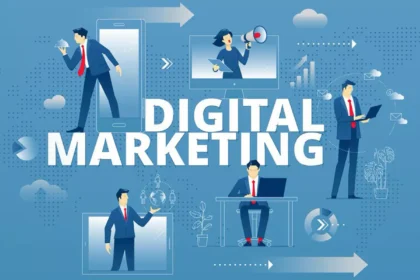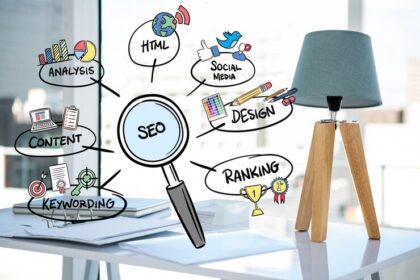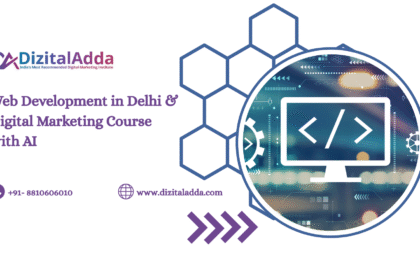In an increasingly digital world, businesses can no longer afford to ignore the power of digital marketing. Whether you’re a start-up looking to grow brand awareness or an established enterprise aiming to increase conversions, digital marketing offers scalable, measurable, and cost-effective solutions to reach your target audience.
This article explores the core components of digital marketing, the latest tools and techniques, and emerging trends that are shaping the digital landscape in 2025.
What Is Digital Marketing?
Digital marketing refers to all marketing efforts that use the internet or electronic devices to connect with potential customers. It encompasses a broad range of strategies including search engine optimisation (SEO), pay-per-click advertising (PPC), social media marketing, content creation, email campaigns, and more.
Unlike traditional marketing, digital marketing allows for real-time analytics and personalisation, making it more dynamic and responsive to user behaviour.
Key Components of Digital Marketing
1. Search Engine Optimisation (SEO)
SEO is the practice of optimising your website and content so that it ranks higher in search engine results pages (SERPs). The goal is to increase organic (non-paid) traffic by targeting relevant keywords that your audience is likely to search for.
SEO includes on-page tactics such as optimising headers, meta descriptions, and content, as well as off-page efforts like backlinks, technical SEO, and user experience.
2. Content Marketing
Content marketing involves creating and distributing valuable, relevant content to attract and engage a specific audience. This can include blog posts, videos, infographics, case studies, and whitepapers.
Content marketing not only boosts SEO but also establishes authority in your industry and builds trust with your audience.
3. Social Media Marketing
Social media platforms like Instagram, LinkedIn, Facebook, TikTok, and X (formerly Twitter) are vital tools for engaging with your audience directly. Each platform offers different advantages:
-
LinkedIn is ideal for B2B marketing and professional networking.
-
Instagram and TikTok are great for brand storytelling and visual content.
-
Facebook provides detailed audience targeting for paid ads.
Social media is excellent for both organic and paid promotion, allowing you to create community-driven campaigns.
4. Pay-Per-Click Advertising (PPC)
PPC allows businesses to place ads on search engines and social media platforms and only pay when the ad is clicked. Google Ads is one of the most popular PPC platforms, offering highly targeted campaigns.
PPC delivers immediate results, making it ideal for time-sensitive promotions or lead generation campaigns. However, it requires careful budgeting and ongoing optimisation.
5. Email Marketing
Despite being one of the oldest digital marketing channels, email marketing remains one of the most effective. It’s excellent for nurturing leads, retaining customers, and driving conversions through personalised communication.
Modern tools allow for automation, segmentation, and behavioural targeting, increasing engagement and reducing unsubscribe rates.
6. Affiliate Marketing
Affiliate marketing is a performance-based strategy where businesses reward affiliates for bringing in new customers. It’s widely used in the e-commerce and SaaS industries, providing a low-risk way to increase reach and revenue.
Affiliates often use blogs, social media, or YouTube channels to promote products or services, earning a commission for every successful referral.
Tools Powering Digital Marketing in 2025
To stay competitive, marketers rely on a range of digital tools for research, automation, analytics, and creative execution. Here are some popular tools in 2025:
-
SEMrush / Ahrefs / Ubersuggest – for keyword research, SEO audits, and backlink tracking.
-
Canva / Adobe Express – for creating professional-looking graphics and social media visuals.
-
Google Analytics 4 (GA4) – for tracking user behaviour, campaign performance, and conversion data.
-
HubSpot / Mailchimp / ConvertKit – for CRM, email marketing, and marketing automation.
-
Meta Ads Manager & Google Ads – for PPC campaign setup, management, and A/B testing.
-
ChatGPT & Jasper AI – for generating blog posts, ad copy, and brainstorming campaign ideas.
Using these tools effectively requires understanding your business goals and aligning the right channels to support them.
Digital Marketing Trends in 2025
Digital marketing is always evolving. Here are some of the key trends shaping strategy in 2025:
1. AI and Automation
Artificial intelligence is transforming how marketers interact with data, content, and customers. From predictive analytics to chatbots and automated email sequences, AI enhances efficiency and personalisation.
In 2025, businesses are using AI to dynamically personalise websites, run adaptive ad campaigns, and analyse customer behaviour in real-time.
2. Voice Search and Conversational Marketing
With smart speakers and mobile assistants becoming mainstream, optimising for voice search is now essential. This means using natural language and long-tail keywords in your content.
Conversational marketing – using tools like live chat, WhatsApp, and social DMs – provides instant support and builds rapport with visitors, improving lead conversion.
3. Short-Form Video Content
Platforms like TikTok, Instagram Reels, and YouTube Shorts have revolutionised video marketing. Audiences now prefer quick, engaging video snippets over long-form content.
Marketers in 2025 are focusing on storytelling, behind-the-scenes videos, and UGC (user-generated content) to increase authenticity and engagement.
4. Privacy and First-Party Data
With the phasing out of third-party cookies, businesses must rely on first-party data collected through owned channels like websites, apps, and email lists.
This shift requires transparent data practices, value-based exchanges (like offering free resources in return for emails), and a focus on customer trust.
5. Sustainability and Ethical Marketing
Today’s consumers are more conscious of the ethical values behind brands. Digital marketers are increasingly showcasing sustainability efforts, DEI (diversity, equity, and inclusion) initiatives, and transparent supply chains to connect with value-driven audiences.
Challenges in Digital Marketing
While digital marketing offers numerous benefits, it’s not without challenges:
-
Rising competition: As more brands go digital, it becomes harder to stand out.
-
Algorithm changes: Platforms like Google and Meta frequently update algorithms, affecting organic reach.
-
Ad fatigue: Users exposed to constant ads may become desensitised or annoyed.
-
Measuring ROI: Especially in multichannel campaigns, it can be difficult to attribute conversions accurately.
-
Skills gap: Not every business has access to in-house experts, making outsourcing or training essential.
The key is continuous learning, regular performance audits, and staying agile.
How to Build a Successful Digital Marketing Strategy
A strong strategy aligns your business objectives with customer needs. Here’s a simplified framework:
1. Set SMART Goals
Make sure your objectives are:
-
Specific
-
Measurable
-
Achievable
-
Relevant
-
Time-bound
Example: “Increase website traffic by 30% in 3 months through SEO and content marketing.”
2. Know Your Audience
Create detailed buyer personas, considering demographics, behaviour, goals, pain points, and preferred channels.
3. Choose the Right Channels
Focus your resources on the platforms where your audience is most active and likely to engage.
4. Create Quality Content
Content is the heart of digital marketing. Focus on value, clarity, and consistency.
5. Track and Optimise
Use data to measure performance and continually refine your tactics.
Final Thoughts
Digital marketing is no longer optional—it’s essential. As businesses navigate the complexities of 2025’s online landscape, the ability to adapt, personalise, and measure every campaign will be critical to success.
From SEO and content to AI-powered tools and ethical branding, digital marketing continues to evolve



